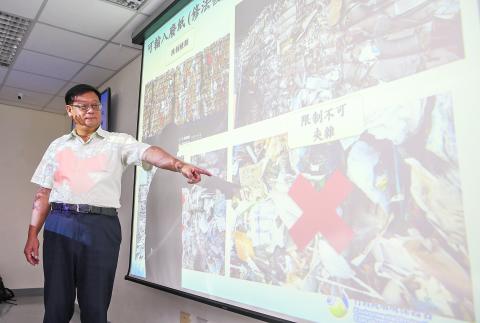New regulations to curb the import of waste plastics and paper, under which violators can be fined up to NT$10 million (US$327,268), were announced yesterday by the Environmental Protection Administration (EPA) and are to take effect on Thursday.
After China implemented a ban on foreign waste imports in January, the amount of waste plastics entering Taiwan between January and July increased by 150,000 tonnes over the same period last year, while waste paper imports grew by 190,000 tonnes, EPA data showed yesterday.
While some industries can recycle waste plastics and paper into new products, the drastic increase in imports alarmed the agency.

Photo: CNA
After proposing the new rules to curb imports on Aug. 13, the EPA last month held a public hearing on the issue, and a revised version of the rules was released yesterday.
Licensed local firms will only be allowed to import waste plastics that originate in their own overseas production processes or those that are of a single material, but not from original production processes, the agency said.
Neither form of waste plastic can be mixed with different materials or contaminated with soil, it added.
The ban on soil pollution is to prevent the entry of foreign animal and plant diseases via waste wrappers produced by the agriculture sector, a suggestion made by environmentalists during the public hearing, EPA Department of Waste Management Director-General Lai Ying-ying (賴瑩瑩) said.
The only waste paper allowed to be imported are kraft paper, corrugated paper or cardboard that is not bleached, or deinked paper, the agency said, adding that only paper makers with legal licenses can import such materials.
“Import of waste newspaper and magazines will continue to be banned because such material is available in Taiwan and opening this sector would affect the already low prices of recycled paper,” Lai said.
Importers would be required to file reports about the flow of their waste, and the EPA and Customs Administration officials are to increase inspections of waste imports at ports, she added.
Importers who contravene the new rules will have to return all their imports to the source nations and could be fined from NT$60,000 to NT$10 million in line with the Waste Disposal Act (廢棄物清理法), the EPA said.
Local importers should not take the new rules lightly, it said.

Taiwan is to commence mass production of the Tien Kung (天弓, “Sky Bow”) III, IV and V missiles by the second quarter of this year if the legislature approves the government’s NT$1.25 trillion (US$39.78 billion) special defense budget, an official said yesterday. Commenting on condition of anonymity, a defense official with knowledge of the matter said that the advanced systems are expected to provide crucial capabilities against ballistic and cruise missiles for the proposed “T-Dome,” an advanced, multi-layered air defense network. The Tien Kung III is an air defense missile with a maximum interception altitude of 35km. The Tien Kung IV and V

The disruption of 941 flights in and out of Taiwan due to China’s large-scale military exercises was no accident, but rather the result of a “quasi-blockade” used to simulate creating the air and sea routes needed for an amphibious landing, a military expert said. The disruptions occurred on Tuesday and lasted about 10 hours as China conducted live-fire drills in the Taiwan Strait. The Civil Aviation Administration (CAA) said the exercises affected 857 international flights and 84 domestic flights, affecting more than 100,000 travelers. Su Tzu-yun (蘇紫雲), a research fellow at the government-sponsored Institute for National Defense and Security Research, said the air

A strong continental cold air mass is to bring pollutants to Taiwan from tomorrow, the Ministry of Environment said today, as it issued an “orange” air quality alert for most of the country. All of Taiwan except for Hualien and Taitung counties is to be under an “orange” air quality alert tomorrow, indicating air quality that is unhealthy for sensitive groups. In China, areas from Shandong to Shanghai have been enveloped in haze since Saturday, the ministry said in a news release. Yesterday, hourly concentrations of PM2.5 in these areas ranged from 65 to 160 micrograms per cubic meter (mg/m³), and pollutants were

Taiwan’s armed forces have established response protocols for a wide range of sudden contingencies, including the “Wan Chun Plan” to protect the head of state, the Ministry of Defense (MND) said today. After US President Donald Trump on Saturday launched a series of airstrikes in Venezuela and kidnapped Venezuelan President Nicolas Maduro, concerns have been raised as to whether China would launch a similar “decapitation strike” on Taiwan. The armed forces regularly coordinate with relevant agencies and practice drills to ensure preparedness for a wide range of scenarios, Vice Minister of National Defense Hsu Szu-chien (徐斯儉) told reporters before a